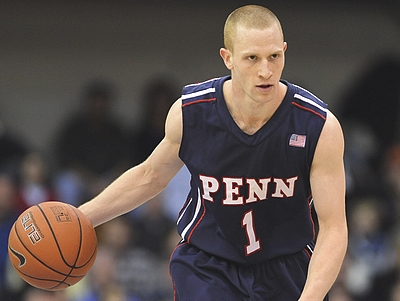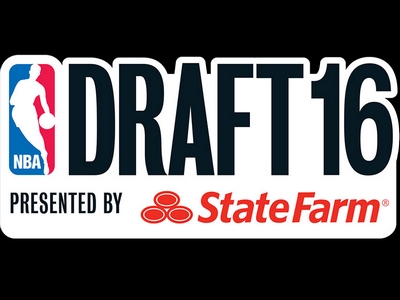Jim Ferris is a master of the body. We meet six days a week, and with class and all, the times vary but we try to stick to the AM or early afternoon. He comes in the Palestra with a big bag of contraptions, and I just show up ready to work.
Ferris is the former strength coach for the 76ers, and he works or has worked with the likes of Rob Kurz, Matt and Pat Carroll, Kyle Korver, Sean Singletary, and Dwayne Jones.
His designs require using muscles I didn't even know existed and my movement patterns have really improved in a short period of time. We do three total body lifts a week and then throw in three different types of plyometric workouts.
To give you a better idea of what I'm working on, here are three of the specific workouts:
Monday is for straight-away speed and jumping. Wednesday focuses on lateral movement and jumping. And Friday is a combination, centered on transitional running and jumping.
We also mix in my favorite, yoga, when we can. I try to get to yoga at least once a week. My mom's a yoga instructor and so I kind of grew up with the practice. Yoga helps me to relax and to really tune in to my body and mind, aligning everything in an hour and a half of pure concentration.
It didn't take long for me to realize as a kid that I didn't have the genetic advantages of the other great players that grew up with. But from a very early age in my life, I have had coaches and people around me who have made it clear: if I want to be successful and close the gap, I better get out there and work my butt off.
I remember how, when I was in high school at St. Benedict's Prep in Newark, New Jersey, coach Danny Hurley kicked me out of practice. Kicked me out! It wasn't rare for him to send guys home, but in my case he said it was because I was slacking and that I wasn't focused. Thanks coach
Psychological tactic or not, I came back the next day with a vengeance and just took it to another level. I feed off that stuff. Ask anyone who knows me and the first thing they'll probably mention is my extreme capacity for work. I go like crazy and I'm constantly looking for ways to improve because I understand that the only shot I have at rising to the top of the basketball world is to outwork everybody.
With that, I've been working extremely hard in preparation for the NBA individual workouts. My day usually consists of an hour and half of skill work, and hour and a half of competition (one on one, three on three, five on five) and either a weight room or agility/movement session.
In the skill session, whether on my own, or with Mike Penberthy, Mike Lintulahti, Coach Lebo, or Coach Allen, I work on a variety of skills, shots, and situations. I do a lot of catch and shoot from deep, creative shots off the dribble into the paint, and pick and roll scenarios from both wings and in the middle.
I also do a series of fast break transition looks, getting it all the way to the rim and pulling up from both foul line area and from range. One of the things I've been working on diligently is a floater. I've never really had a floater in my game but it's a necessity for all small guards who want to play in the league to be able to get into the paint and float it up right over the closing 7-footer.
There are a number of guys who I work out with and who I've come to know over the years in Philly, but I've been blessed that Sean Singletary has been around and working out this past month or so. We have developed a great relationship and he's a hell of a competitor. We play a lot of 1 on 1- dude is a tough cover and he challenges my lateral quickness. I try to find a 5 on 5 game either here at Penn with my teammates or over at Temple.
But basketball is not just a physical game. The mechanics of anything can be figured out by anyone. I think you can teach yourself to hit that deep three sure, everyone's learning curve is different, but it is attainable. But I'm a big believer in what Tony Robbins professes: everything in life is 80% mental and 20% physical.
I like to say that I'm half-Buddhist. I started to realize that around my sophomore year when I began meeting with a professor on campus. Keith Weigelt teaches strategy here at the Wharton School of Business and he has been instrumental in shaping my mental approach to the game.
Keith has convinced me to take a long look at Eastern Philosophy. Together we've read and analyzed The Art of War by Sun Tzu and The Book of Five Rings by Musashi.
Basically, we determine to maintain the normal mind in all situations. We try to limit any variance in our state of mind so that our results will be consistent. The elimination of value judgments and the commitment that you will never, ever get discouraged are paramount to adopting this way of thinking. As Keith professes, I will always believe in myself because I know that I work hard and that I'm prepared.
A lot of this mental strategy is about detaching from the results and simply focusing on the process. In that vain, I'm totally immersed in the process of improving my game. I'm just trying to gain small victories every single day. Inch by inch.
Wherever it all leads me (the NBA, or somewhere else), I'll know that I have done my best. And hey, what more can you do than your best?
I'm new and lonely on the Twitter scene, so follow me @ZRoze1 for some updates and pictures as I continue on this journey. Catch you next time.
Ferris is the former strength coach for the 76ers, and he works or has worked with the likes of Rob Kurz, Matt and Pat Carroll, Kyle Korver, Sean Singletary, and Dwayne Jones.
His designs require using muscles I didn't even know existed and my movement patterns have really improved in a short period of time. We do three total body lifts a week and then throw in three different types of plyometric workouts.
To give you a better idea of what I'm working on, here are three of the specific workouts:
Monday is for straight-away speed and jumping. Wednesday focuses on lateral movement and jumping. And Friday is a combination, centered on transitional running and jumping.
We also mix in my favorite, yoga, when we can. I try to get to yoga at least once a week. My mom's a yoga instructor and so I kind of grew up with the practice. Yoga helps me to relax and to really tune in to my body and mind, aligning everything in an hour and a half of pure concentration.
It didn't take long for me to realize as a kid that I didn't have the genetic advantages of the other great players that grew up with. But from a very early age in my life, I have had coaches and people around me who have made it clear: if I want to be successful and close the gap, I better get out there and work my butt off.
I remember how, when I was in high school at St. Benedict's Prep in Newark, New Jersey, coach Danny Hurley kicked me out of practice. Kicked me out! It wasn't rare for him to send guys home, but in my case he said it was because I was slacking and that I wasn't focused. Thanks coach
Psychological tactic or not, I came back the next day with a vengeance and just took it to another level. I feed off that stuff. Ask anyone who knows me and the first thing they'll probably mention is my extreme capacity for work. I go like crazy and I'm constantly looking for ways to improve because I understand that the only shot I have at rising to the top of the basketball world is to outwork everybody.
With that, I've been working extremely hard in preparation for the NBA individual workouts. My day usually consists of an hour and half of skill work, and hour and a half of competition (one on one, three on three, five on five) and either a weight room or agility/movement session.
In the skill session, whether on my own, or with Mike Penberthy, Mike Lintulahti, Coach Lebo, or Coach Allen, I work on a variety of skills, shots, and situations. I do a lot of catch and shoot from deep, creative shots off the dribble into the paint, and pick and roll scenarios from both wings and in the middle.
I also do a series of fast break transition looks, getting it all the way to the rim and pulling up from both foul line area and from range. One of the things I've been working on diligently is a floater. I've never really had a floater in my game but it's a necessity for all small guards who want to play in the league to be able to get into the paint and float it up right over the closing 7-footer.
There are a number of guys who I work out with and who I've come to know over the years in Philly, but I've been blessed that Sean Singletary has been around and working out this past month or so. We have developed a great relationship and he's a hell of a competitor. We play a lot of 1 on 1- dude is a tough cover and he challenges my lateral quickness. I try to find a 5 on 5 game either here at Penn with my teammates or over at Temple.
But basketball is not just a physical game. The mechanics of anything can be figured out by anyone. I think you can teach yourself to hit that deep three sure, everyone's learning curve is different, but it is attainable. But I'm a big believer in what Tony Robbins professes: everything in life is 80% mental and 20% physical.
I like to say that I'm half-Buddhist. I started to realize that around my sophomore year when I began meeting with a professor on campus. Keith Weigelt teaches strategy here at the Wharton School of Business and he has been instrumental in shaping my mental approach to the game.
Keith has convinced me to take a long look at Eastern Philosophy. Together we've read and analyzed The Art of War by Sun Tzu and The Book of Five Rings by Musashi.
Basically, we determine to maintain the normal mind in all situations. We try to limit any variance in our state of mind so that our results will be consistent. The elimination of value judgments and the commitment that you will never, ever get discouraged are paramount to adopting this way of thinking. As Keith professes, I will always believe in myself because I know that I work hard and that I'm prepared.
A lot of this mental strategy is about detaching from the results and simply focusing on the process. In that vain, I'm totally immersed in the process of improving my game. I'm just trying to gain small victories every single day. Inch by inch.
Wherever it all leads me (the NBA, or somewhere else), I'll know that I have done my best. And hey, what more can you do than your best?
I'm new and lonely on the Twitter scene, so follow me @ZRoze1 for some updates and pictures as I continue on this journey. Catch you next time.































Comments